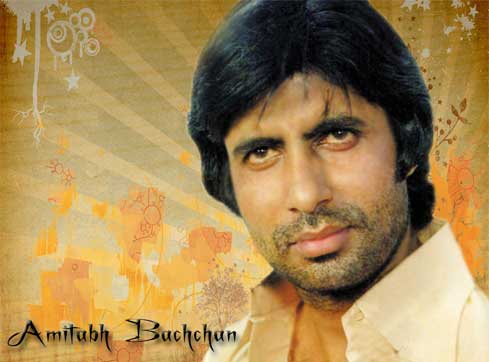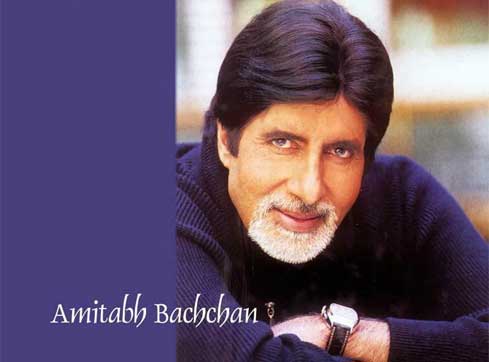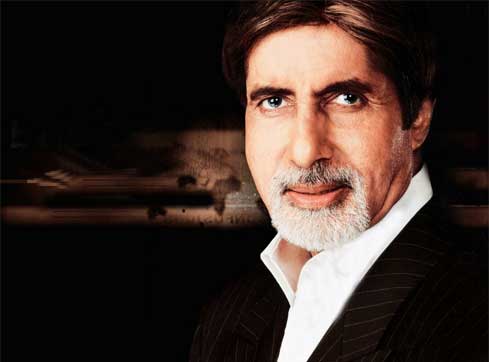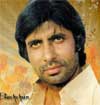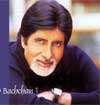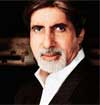 Early work
Early work
Amitabh Bachchan made his film first appearance in 1969 as a voice narrator in Mrinal Sen's National Award charming film Bhuvan Shome. From then on he got his initial acting role as one of the seven protagonists in Saat Hindustani, a movie directed by Khwaja Ahmad Abbas and featuring Utpal Dutt, Madhu and Jalal Agha. Though the movie was not a monetary success, Bachchan won his initial National Film Award for Best Newcomer.
 Parwaana
Parwaana
Anand (1971) tagged on, where he starred beside Rajesh Khanna. Bachchan's character as a doctor with a skeptical view of life garned him his first Filmfare Best Supporting Actor Award. He then played his first pessimistic role as a besotted lover-turned-murderer in Parwaana (1971).
 Reshma Aur Shera
Reshma Aur Shera
This was pursued by quite a few films counting Reshma Aur Shera (1971). In this time, he made a guest facade in the movie Guddi in which he starred with his future wife Jaya Bhaduri. Then came the film Bawarchi. In 1972, he made an outward show in the road action comedy Bombay to Goa, directed by S. Ramanathan. Several of his films during this early era did not do well, but that was about to change.
 Rise to stardom
Rise to stardom
Director Prakash Mehra directed him in the chief role for the movie Zanjeer (1973) as Inspector Vijay Khanna. The film was a spiky contrast to the passionately themed films that had commonly leaded it and recognized Amitabh in a new–fangled persona–the "angry youthful man" of Bollywood cinema. He received a Filmfare nomination for Best Actor. Filmfare considers this one of the iconic performances of Bollywood record. The year 1973 was also when he wedded Jaya, and about that time they emerged in quite a lot of films together; not only in Zanjeer but in movies such as Abhimaan which was pursued and was unconfined only a month after their wedding. Afterward, Bachchan played the character of Vikram in the movie Namak Haraam, a social stage show directed by Hrishikesh Mukherjee and scripted by Biresh Chatterjee which addresses the ideas of friendship. His supporting role won him his second Filmfare Best Supporting Actor award.
 Kunwara Baap
Kunwara Baap
In 1974, Bachchan made quite a few guest appearances in movies such as Kunwara Baap and Dost, before playing a supporting character in Roti Kapda Aur Makaan. The movie, directed and written by Manoj Kumar, addressed matters of honesty in the face of repression and financial and arousing hardship. Bachchan then played the foremost character in film Majboor, unconfined on 6 December 1974, which was a recreate of the Hollywood film Zigzag.
 Chupke Chupke
Chupke Chupke
The movie was only a fair success at the box office. In 1975, he starred in a range of film genres from the comedy Chupke Chupke, the felony drama Faraar to the romantic drama Mili. 1975 was the year when he appeared in two movies which are stated as vital in Hindi cinematic history. He starred in the Yash Chopra directed movie Deewaar, differing Shashi Kapoor, Nirupa Roy, and Neetu Singh, which earned him a Filmfare Nomination for Best artist.
 Deewaar
Deewaar
The movie became a chief hit at the box office in 1975, ranking in at number 4. Indiatimes Movies ranks Deewaar in the midst of the Top 25 Must See Bollywood Films. Unconfined on 15 August 1975 was Sholay (meaning flames), which became the uppermost grossing movie of all time in India, earning INR 2,36,45,00,000 Rs equal to US$ 60 million, after altering for inflation.
 Film of the Millennium
Film of the Millennium
Bachchan played the task of Jaidev. In 1999, BBC India affirmed it the "Film of the Millennium" and like Deewar, has been cited by Indiatimes movies as among the Top 25 Must See Bollywood Films. In that similar year, the judges of the 50th annual Filmfare Awards honored it with the unique distinction award entitled Filmfare Best Film of 50 Years.
 Kabhie Kabhie
Kabhie Kabhie
Bachchan starred in comedies such as Chupke Chupke (1975) and Amar Akbar Anthony (1977) and in movies such as Kabhie Kabhie (1976). In 1976, he was again cast by director Yash Chopra in his second movie, Kabhi Kabhie, a romantic story in which Bachchan starred as a juvenile poet named Amit Malhotra who falls intensely in love with a gorgeous young girl called Pooja played by actress Rakhee Gulzar.
 Kasme Vaade
Kasme Vaade
The movie saw him again nominated for the Filmfare Best Actor Award. In 1977, he won his first Filmfare Best Actor Award for his recital in Amar Akbar Anthony where he played the third lead differing Vinod Khanna and Rishi Kapoor as Anthony Gonsalves. In 1978 he starred in all four of the chief grossing films of India in that year. He once again restarted double roles in movies such as Kasme Vaade as Amit and Shankar and Don playing the roles of Don, a leader of an underworld gang and his look similar to Vijay.
 One-man industry
One-man industry
His act won him his second Filmfare Best Actor Award. He also performed in Trishul and Muqaddar Ka Sikandar which both earned him more Filmfare Best Actor nominations. He was allocated a "one-man industry" by the French director Francois Truffaut.
 Mr. Natwarlal
Mr. Natwarlal
In 1979, for the first time, Amitabh was requested to use his singing voice for the film Mr. Natwarlal in which he starred at the side of Rekha. His performance in the movie saw him nominated for both the Filmfare Best Actor Reward and the Filmfare Best Male Playback Awards. In 1979, he also established Best Actor nomination for Kaala Patthar (1979) and then went on to be nominated once more in 1980 for the Raj Khosla directed film Dostana, in which he starred contradictory Shatrughan Sinha and Zeenat Aman. Dostana proved to be the top grossing film of 1980. In 1981, he starred in Yash Chopra's melodrama movie Silsila, where he starred next to his wife Jaya and rumoured lover Rekha. Other films of this period comprise Ram Balram (1980), Shaan (1980), Lawaaris (1981), and Shakti (1982) which eroded him alongside well-known actor Dilip Kumar.
 Filming Coolie
Filming Coolie
On 26 July 1982, while shooting for Coolie in the University Campus in Bangalore, Bachchan got a fatal intestinal injury during the filming of a clash scene with co-actor Puneet Issar. Bachchan was performing his own stunts in the movie and one scene was necessary for him to fall onto a table and then on the ground. On the other hand as he jumped towards the table, the corner of the table struck his abdomen, resulting in a spleenic rupture from which he lost a considerable amount of blood. He required a crisis splenectomy and remained perilously ill in hospital for several months, at times close to death. The civic response incorporated prayers in temples and offers to forfeit limbs to save him, while afterward; there were long queues of well-wishing fans outside the hospital where he was recovering. On the other hand, he spent many months recuperating and continued filming later on that year after a long period of recuperation. The movie was released in 1983, and partially due to the enormous publicity of Bachchan's accident, the film was a box office victory.
 Coolie
Coolie
The director, Manmohan Desai, changed the finishing of Coolie after Bachchan's accident. Bachchan's character was formerly intended to have been killed off but after the transform of script, the character lived in the conclusion. It would have been unfortunate, said Desai, for the man who had just fended off demise in real life to be killed on screen. Also, in the released movie the footage of the fight scene is frozen at the serious moment, and a caption appears onscreen marking this as the moment of the actor's injury and the ensuing publicity of the accident.
In a while, he was spotted with Myasthenia gravis. His illness made him feel weak both psychologically and physically and he decided to relinquish films and gamble into politics. At this time he became negative, expressing anxiety with how a new film would be established and stated before every release, "Yeh film to flop hogi!" ("This film will flop").
 Producer
Producer
Bachchan turned producer during his temporary retirement era, setting up Amitabh Bachchan Corporation, Ltd. (A.B.C.L.) in 1996, with the dream of becoming a 10 billion rupees (approx 250 million $US) premier entertainment company by the year 2000. ABCL's strategy was to begin products and services covering the whole section of the India's entertainment industry. Its operations were mainstream profitable film production and distribution, audio cassettes and video discs, production and marketing of television software, celebrity and event management. Quickly after the company was launched in 1996, the first movie was produced by the company. Tere Mere Sapne botched to do well at the box office but launched the careers of actors such as Arshad Warsi and South film star Simran. ABCL produced a few other movies, none of which did well.
 Mrityudata
Mrityudata
In 1997, Bachchan afforded to make his acting comeback with the film Mrityudata, produced by ABCL. Though Mrityudaata tried to reprise Bachchan's previous success as an action hero, the film was a crash both fiscally and decisively. ABCL was the chief sponsor of the 1996 Miss World beauty pageant, Bangalore but lost millions. The mess and the consequent legal battles surrounding ABCL and a variety of entities after the event, coupled with the fact that ABCL was reported to have overpaid most of its top level managers, ultimately led to its financial and operational collapse in 1997.
 Bade Miyan Chote Miyan
Bade Miyan Chote Miyan
The business went into administration and was later on declared a failed company by the Indian Industries board. The Bombay high court, in April 1999, controlled Bachchan from selling off his Bombay bungalow 'Prateeksha' and two flats till the awaiting loan recovery cases of Canara Bank were disposed of. Bachchan had, on the other hand, pleaded that he had mortgaged his bungalow to Sahara India Finance for hoisting funds for his company.
Bachchan cracked to revive his acting career and had standard success with Bade Miyan Chote Miyan (1998), and received optimistic reviews for Sooryavansham (1999) but other movies such as Lal Baadshah (1999) and Hindustan Ki Kasam (1999) were box office collapses.
 Return to prominence:
Return to prominence:
In 2000, Amitabh Bachchan emerged in Yash Chopra's box-office hit, Mohabbatein, directed by Aditya Chopra. He played a harsh, older figure that challenged the character of Shahrukh Khan. His task won him his third Filmfare Best Supporting Actor Award. Other hits chased, with Bachchan appearing as an older family patriarch in Ek Rishtaa: The Bond of Love (2001), Kabhi Khushi Kabhie Gham... (2001) and Baghban (2003). As an artist, he sustained to execute in a range of characters, receiving serious praise for his performances in Aks (2001), Aankhen (2002), Khakee (2004) and Dev (2004).
 Sanjay Leela Bhansali's Black
Sanjay Leela Bhansali's Black
One project that did mainly well for Bachchan was Sanjay Leela Bhansali's Black (2005). The movie starred Bachchan as an aging teacher of a deaf-blind girl and followed their relationship. His act was commonly praised by critics and viewers and won him his second National Film honor for Best Actor and fourth Filmfare Best Actor Award. Taking lead of this renaissance, Amitabh began endorsing a diversity of products and services, appearing in many television and billboard advertisements.
 Baabul
Baabul
In 2005 and 2006, he starred with his son Abhishek in the hit pictures Bunty Aur Babli (2005), the Godfather tribute Sarkar (2005), and Kabhi Alvida Na Kehna (2006). All of them were victorious at the box office. His afterward releases in 2006 and early 2007 were Baabul (2006), Ekalavya and Nishabd (2007), which botched to do well at the box office but his performances in each of them, were commended by critics.
 Cheeni Kum
Cheeni Kum
In May 2007, two of his movies Cheeni Kum and the multi-starrer Shootout at Lokhandwala were released. Shootout at Lokhandwala did very well at the box office and was affirmed a hit in India, while Cheeni Kum picked up after a slow start and only had standard success. A remake of his biggest hit, Sholay (1975), entitled Ram Gopal Varma Ki Aag, unconfined in August of that similar year and proved to be a main commercial failure in accumulation to its poor vital reception.
 The Last Lear
The Last Lear
The year also marked Bachchan's first look in an English-language film, Rituparno Ghosh's The Last Lear. The movie premiered at the 2007 Toronto International Film Festival on 9 September, 2007. He received encouraging reviews from critics who sleeted his performance as his finest ever since Black. Bachchan was slated to play a sustaining character in his primary international film, Shantaram, directed by Mira Nair and starring Hollywood actor Johnny Depp in the escort. The movie was due to start filming in February 2008 but due to the writer's beat, was pushed to September 2008.The movie is at present "shelved" for ever. Vivek Sharma's Bhoothnath, in which he plays the title character as a ghost, was unconfined on 9 May, 2008.
 Sarkar Raj
Sarkar Raj
Sarkar Raj, the follow-up of the 2005 film Sarkar, unconfined in June 2008 and received an optimistic retort at the box-office. Paa, which released at the ending of 2009, was an extremely projected project as it saw him playing his own child Abhishek's Progeria-affected 13-year-old son, and it released to favourable reviews, mainly towards Bachchan's performance. It won him his third National Film Award for Best Actor and fifth Filmfare Best Actor Award. In 2010, he first appeared in Malayalam film through Kandahar, directed by Major Ravi and co-starring Mohanlal. The movie was based on the hijacking event of the Indian Airlines Flight 814. Bachchan did not obtain any wage for this film.

